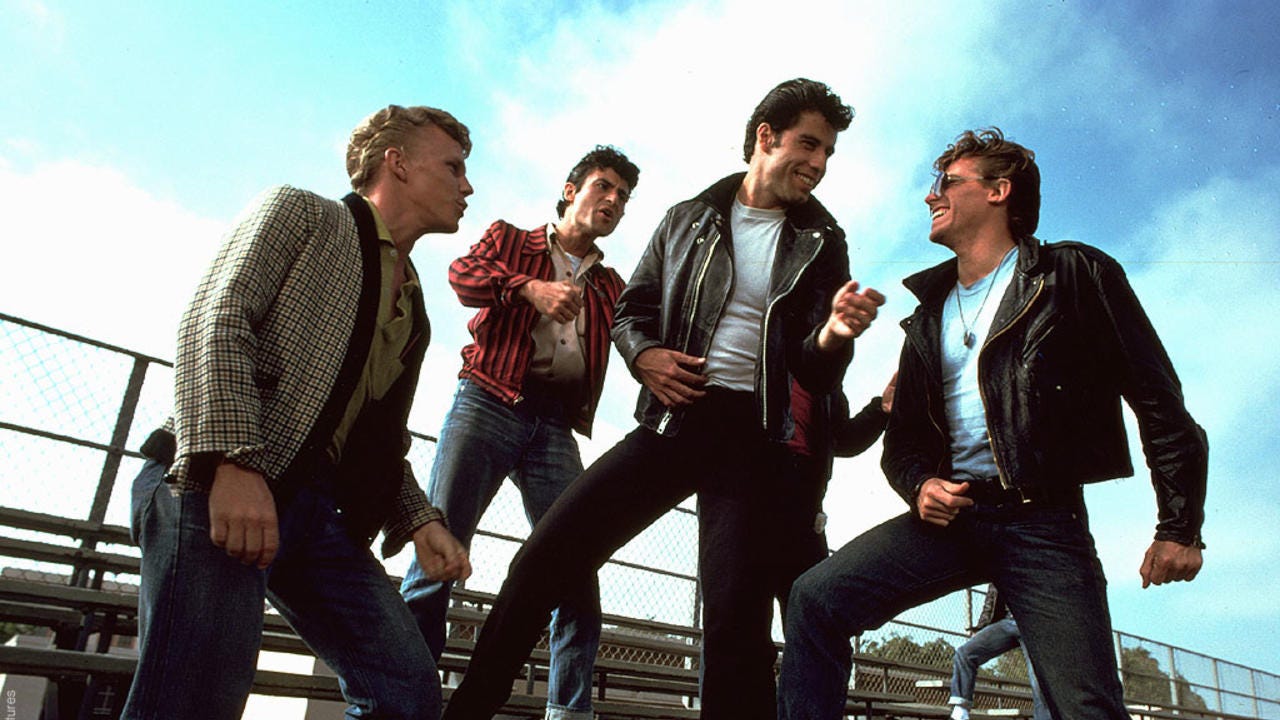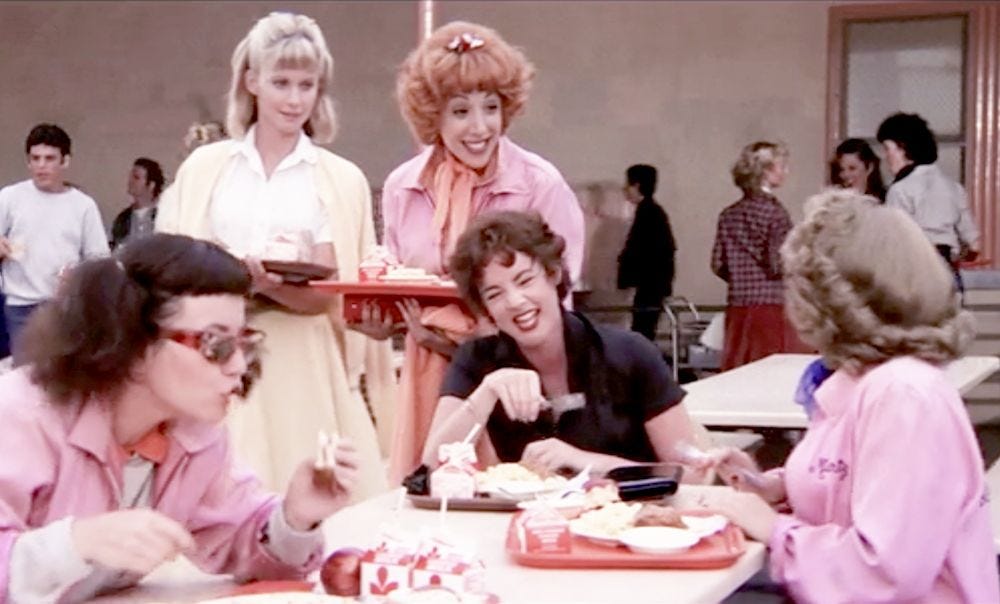Part 15 - The Sexed Up World Of 'Grease' Has Mesmerising Melodies But A Dubious Moral Message
Are the thumping rhythms of Grease enough to save it from the ruins of misogyny and testosterone?
After a lifetime of avoiding it, the fickle fairies of fate have finally intertwined my hands with that of Grease. I have managed to dodge it on various occasions, but I always seemed to know that it was lurking somewhere ahead in my distant future. First, it sprung up in the finale of my year 6 days in the form of a celebration concert, where we sang the closing number of Grease together. All I can really remember from that was how hard it was to sing ‘rama lama lama ka dinga da dinga dong’ as the other classes created a cacophony with ‘shoo-bop sha wadda wadda yippity boom de boom.’ Then, I essentially came into direct contact with the film itself, in a year 8 ‘dance’ class. I say ‘dance’ because instead of cancelling the lesson altogether, they stuck on Grease on an old, wheeled-in TV as the dance teachers and students prepared for a recital later that evening. Our tiny, dazed heads watched in bafflement as pelvis were thrusted and cars gleamed, but we had little to no context as the volume was so low and ladders were hap-hazardously dragged past. We didn’t even finish it. Most recently, it was chosen as the school musical and, as a kind of celebration of my final year there, I was going to audition as Sandy. But, due to exams, this never came to fruition. So, as frayed as the lines between myself and Grease were, they have now been seamlessly connected. Or rather I bit the bullet and gave it a proper go, so to speak.
I used to be of the opinion that to like musicals was some form of social alienation. Musicals had the deceptive appearance of a film but they were slathered with sickeningly soft and wildly unrealistic romances, that trilled and pirouetted much too suddenly, much too cleanly. I liked the scaffolding of film, so I failed to understand the point of deviating away from it. Why take away the traditional conventions of classic dialogue and replaced it with frilly, over-produced musical sequences that made no sense socially? When would this ever happen in real life? But, over time and with a great deal of exposure, my brain has been unpicked and rewired. Musicals such as Chicago, La La Land, Cabaret, Tick Tick Boom helped me to understand something fundamental that I had never seen before or perhaps even - heard. None of these came from some place of false insanity; musicals blossom, echo with vitality and truth and power. As a person who dwells within the comfort of headphones, I realised that those musical breaks only served to heighten what was within and that’s what I live for, with regards to music.
So, with these new-found discoveries echoing like a refrain in my mind, I approached my sister with the viewing of Grease. I warned her though, as water-coloured memories of dusty cliches dripped into focus. But, something I love about watching films with my sister is that it becomes our own, personal comedy show. When I’m with her, our humour harmonises and rumbles into crescendos of raucous laughter at the simplest of nuances. Be it a line delivery, some little body spasm, a scene change - we find a way to make it our own trivial moment together. So, please hold onto this as my review spins out before you - that this watch gifted us an evening of entertainment and mirth.

Grease (1978), directed by Randal Kleiser, features the goings-on at the fictional Rydell High School, in the year 1959. We meet Sandy Olsson (played by Olivia Newton-John), an Australian transfer student who has joined the Pink Ladies group at school. Spearheaded by the flirtatious Rizzo (Stockard Channing), the group are concerned with few things: sleepovers, the colour pink and, of course, boys. Meanwhile, Danny Zuko (John Travolta) is the leader of the T-Birds Greaser gang, who sport the signature oil-slick hair, rippled leather jackets and simple white T-shirts. Danny and Sandy run into one another and we learn that they had a romantic fling in Australia, where Danny had vacationed in the summer. Fate has seemingly pushed them together once more but, there are complications in the new-found setting of Rydell High. There is a duality within Danny; he has this secret, understated yearning for softness and intimacy with Sandy and yet a sex-obsessed, too-cool-for school persona that he must maintain around his gang. So, as the lives of the Rydell students spin out before us, what will happen as they collide and combine with one another? Will Sandy and Danny make it through the sea of social conventions and dance their way back to one another?
What is so excellent about Grease is how evocative it is of the 50s; the thrumming heat of sexual desire, Elvis knockoffs, proms with choreographed dances, the silhouettes adorned with alluring blacks, softened yellows and garish pinks. It sizzles and bubbles with this sense of hidden energy, this unreleased tension that, much like a young couple new to love, makes it impossible for audiences to keep their hands away from its enigmatic, sexual power. The set pieces are of equal enchantment, with the transformation of the car garage from oil-stains to glistening white walls. It is, therefore, understandable to see why exactly this film is lorded as such a classic. What elevated this feeling were its range of booming, swinging melodies. From the opening cartoonish credits set to Frankie Valli’s funky rendition of ‘Grease,’ to that divine falsetto at the end of ‘Summer Nights,’ from the swelling desperation of ‘Hopelessly Devoted To You’ to the bluesy, rock and roll zing of ‘Grease Lightning’ - Grease never fails to miss a beat with its explosive sound.
Travolta’s performance as Danny seemed to be levels above his co-stars, as he created an aura of attraction akin only to the King of Rock and Roll himself. With his sharp quiff and gyrating hips, he seemed to flourish with the 50s running steeply through his veins. With an powerfully unique vocal (with vocal affectations that left us in fits of giggles) and a liquidity to his dance movements, it was enough for even me (who never found Travolta to be my idea of attractive) to say to my sister ‘You know, there’s just something about a man in a plain black T-shirt’ during the iconic Grease Lightning scene. Rizzo was another standout, as she seemed to emulate an early Regina George à la Mean Girls. Her promiscuous demeanour underlines Sandy’s innocence, cutting through it to provide a uniquely snide storyline.

Despite the arousing scent of Grease, it was significantly soured by some rather dubious messaging. The role of women, in particular, cast a great shadow over what could have been a spectacular set of nuances. For a film that boasts such an intense colour palette, Grease is marred by its black and white stereotyping. Women are either whores or nerds or virgins who somehow sustain quantities of abuse in every category. Take Sandy - she is belittled and mocked by the Pink Ladies, particularly Rizzo, for not wishing to smoke or drink and for her abstinence. She becomes nothing more than an untouchable, vapid object, to sit there and look pretty and to create a rather obvious foil to Rizzo. Rizzo is wrecked to an even greater extent. She is repeatedly shamed for her blatant sexual desires and is basically projected to be a slut, which comes to a head when she narrowly evades pregnancy at the finale. She is gifted a whole ballad dedicating to reshaping our perspective of her and her intention with men, but then is right back to snogging Kenickie at the conclusion. This was an embarrassing display of female desire and sexuality, especially as the male characters are carved out in the image of sex-starved maniacs. It all feels very crass, as female desire is already taboo enough in pop culture.
Me and my sister started a fun little game of counting out each sexist offence this film committed. We did, in fact, lose count. There were both throw-away lines and entire songs that were yet again poised directly against women, that degraded and objectified. Especially when Rizzo’s mocking song 'Look At Me I’m Sandra Dee’ played out, as she donned a blonde wig and flitted around the room, pulling prayer positions. It felt even sicker to see this misogyny coming from the additional female characters. What was perhaps even worse was the movie’s finale. After being border-lined assaulted by Danny, Sandy decides that she is the one who must do the changing. She abandons her girlish yolk-yellow swing dress for a tight fitting, off the shoulder black leather catsuit, with heavy lids and bouncing curls. This trope, which unfortunately reared its misshapen head in The Breakfast Club (1985), pushed this film further into the realms of deep offence. What kind of message is this giving to young, impressionable women who are seeking to establish their first relationships? That they should change for the boorish, cave-men who seek them out for one thing and one thing only?

I was also left underwhelmed by Olivia Newton-John’s performance as it felt empty and devoid of any true personality, regardless of her ‘sexy’ transformation. I doubt this was much to do with her and more the material, which was very obviously one-dimensional at best. However, she sadly paled in comparison next to the towering figure of Danny Zuko. Its translation from stage to screen (as it was a Tony-nominated musical that opened in ‘72) also felt incredibly scattered for the viewer. We bounce around, rather unsuccessfully, from the story of Danny and Sandy to the adventures of Rizzo, from the beauty-school dropout story line of Frenchie to the greaser gang rivalries. It feels confused, we have individual songs and moments that aren’t massively cohesive and we start to get lost in loose ends. The final song made this issue even more pronounced, however, as everyone is suddenly united by the cast’s join rendition of ‘We Go Together.’ The threads hadn’t been spun together for me and my sister and we were left reeling as the students beamed and ran about at the fair, all very recent qualms and quarrels seemingly abandoned. It tailed off even further as the final shot of the film features Danny and Sandy, taking off shakily into the sun in a car that apparently flies? It just felt loose and flabby by this point, with an ending that had felt rushed and last-minute. So, after deliberating with my sister, Grease was gifted a 2/5 stars.
Well, at the end of the day, at least I can say that I have now watched Grease. And, yes, it was as uncomfortably stock-character-ridden as I had expected. It felt like a dusty relic that you pull from a busy shelf, muse over briefly before placing it in a better-suited home, a charity shop. So, no, the bursts of rhythmic joy and emotional turmoil in Grease’s score were not enough to save it from the dregs of misogyny. The testosterone leaked from every pore, infecting all it touched with its leathery black curse. But, there was something raucously entertaining in just how out of touch this film was, how rapidly it flooded through its wheel of story lines, how danceable the beat was. It was stupidly engaging but not to the point where I can misplace the stench of sexism that overpowers the viewer like a desperate man’s aftershave. But hey, at least I found out I can do Danny’s funky knee dance thing.
BellaWatchesFilms



